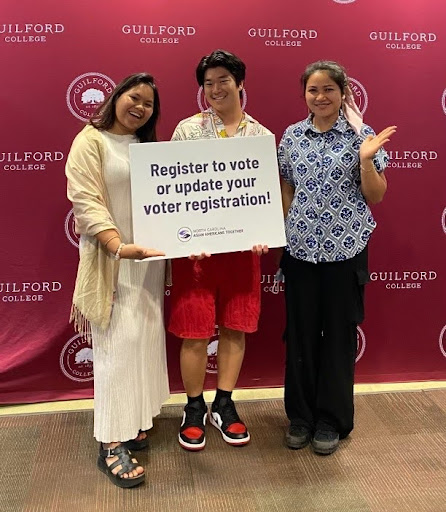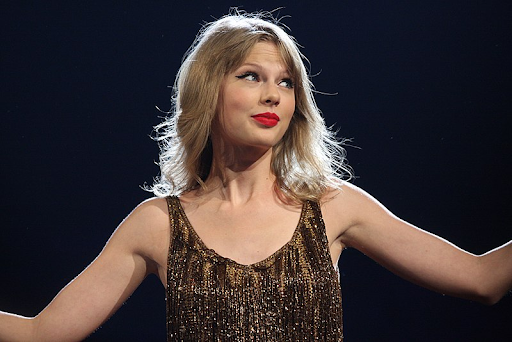Narratives offer insight into immigrant journeys
On Nov. 13, Immigrant Student Coordinator Liz Torres Melendez and the Intercultural Engagement Center hosted an evening where staff, visitors and students met for dinner in the Gilmer Room to hear the stories of faculty and staff members who immigrated into the United States.
Among the faculty and staff members who recounted their stories were Resident Diversity Librarian José J. Morales-Benítez, Engaged Teaching Specialist and Program Coordinator Sonalini Sapra, Associate Professor of History Zhihong Chen and Director of QLSP and Lecturer in Public Health Aleks Babic.
In the dark Gilmer room, as guests sat at round tables enjoying dinner from the caf, the voices of the panelists resonated with all. Each of the panelists expressed their vulnerability through recounting their journeys from their native countries to the United States.
The discussion opened with a question: When and how did you come to the United States? What led you to Guilford?
Sapra, from New Delhi, India, and belonging to the Dalit caste (or “the untouchables”), expressed how her mother encouraged her to move to the United States.
“She saw that if I had stayed in India, I would have probably succumbed to peer pressure and my family pressure and ended up getting married,’’ said Sapra.
Babic, born and raised in Sarajevo, Bosnia, came as a refugee with their parents to Greensboro. Babic was 7 years old when a civil war broke out, and did not attend school until after moving to the U.S in sixth grade.
“My experience also coming here was that many people perceived me to be a lot older than I was, which is 11 (in this photo),” said Babic. “I think that part speaks to growing up in a war. You know, you just look very serious after a while.”
Living in war-torn Bosnia, Babic and their family experienced many difficulties and encountered both physical and emotional trauma, in the same way many refugees do.
“When I was 7 years old, I was also shot during the war, which obviously has shaped my life in many ways,” said Babic. “And then fast forward about 20 years later, I was leaving Guilford and I went to a gas station—and this is pretty intense—but basically in the middle of an afternoon, Wednesday afternoon, I ended up with the same police shooting, which was horrible, and then essentially had a very hard time living my life for the next two to three years.”
The trauma Babic went through in Bosnia followed them into the United States as they witnessed gun violence once again.
Not only must refugees and immigrants deal with their past, they must also adjust to their new environments, and this transition may not always be easy. Morales-Benítez recognized that although the transition is hard, he holds a special privilege that not many immigrants do.
Morales-Benítez, who arrived in the United States about five months ago from Puerto Rico, states:
“Having (U.S) citizenship, I’m aware, gives me a lot of privileges in terms of moving to the U.S that other people don’t have when they’re moving from other places,” he said. “I don’t have to face the possibility of deportation that a lot of people have to face, and I didn’t have to go through the process of getting a work visa.”
Some of the panelists acknowledged their privileges, such as being white in the U.S. or holding American citizenship. Despite these privileges, they all have gone through difficult experiences and have made sacrifices in search of a better life in the U.S. Their stories are worth hearing as they traverse between the misconceptions of the immigrant in society.
In some cases, their existences defy societal conventions, as Chen’s story conveys.
A native from a rural province in North China, Chen arrived in the U.S. in the year 2000. She was a first-generation college student and her parents were farmers. In a country where having no sons is understood to be a misfortune, she was one among three daughters. In Chen’s village, people discriminated against her family, as they were indoctrinated in the traditional belief of valuing male sons.
“As the oldest among the three daughters, I somehow … felt the need to earn honor for my family, for my parents, as a way to—I don’t know—to balance the discrimination or suffering my family felt,” said Chen.
The following question was then asked: What would you say has been the biggest challenge you have faced since coming to the United States?
“One of my challenges was adapting to an American system of education,” said Sapra. “Loneliness was another big challenge. I was taken aback by the level of casteism that I experienced from Indians here in the U.S.”
Morales-Benítez stated that his biggest difficulty has been professional stress, with him adapting to his new work environment and technology that was not prevalent in Puerto Rico.
Babic states their biggest challenge has been “growing up super poor.” Growing up, Babic lived in Section 8 housing, recieved Medicaid and had parents who worked factory jobs.
“My mom, for example, was working second shift making computer chips,” said Babic. “She had like minimum quotas that she had to meet, and so when she couldn’t finish her work at work she would bring it home, and for no extra pay our entire family would sit around and work on the computer chips together.”
Babic expressed that the effects of experiencing economic crisis are lasting, as upward class mobility is not easy and the identity and responsibility of being an immigrant or immigrant’s child is something that can never be changed.
“I’m still an immigrant kid who still has to take care of various things, so it’s that kind of stuff that never really goes away,” said Babic.
Chen expressed that her biggest challenge has been a sense of isolation.
“Our world is kind of small, sometimes it feels small,” said Chen. “It takes some time to figure out what might be a good place to hang out.”
Chen’s sentiments were common among the panelists, and speak volumes for those who have ever moved to a new place.
The traumas, experiences and difficulties of immigrants and refugees are a living object of permanence. As they live in a constant fight for acceptance in the United States, that living object of permanence continues to exist in the form of memories, pain, struggle and evolution.
The stories shared during the Nov. 13 event made attendees acknowledge the common themes of human existence. At the end of the evening, as the talk came to a close, an atmosphere of acceptance, awareness and positivity radiated.









